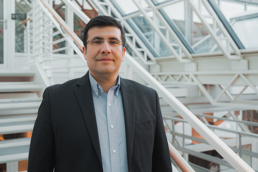No papers, no treatment
-
Sist oppdatert
17. september 2025
-
Kategori
Ensuring that all residents - including undocumented immigrants - can access essential services, will strengthen public health and resilience.
SCIENCE NEWS FROM KRISTIANIA: Health and immigration
This text was published at Science Norway on the 16th September 2025 titled "No papers, no treatment".
Summary:
-
Undocumented immigrants face major barriers to healthcare, relying on emergency services as their only option, writes professor Adnan Kisa.
-
Exclusion creates humanitarian risks and threatens public health, with issues like untreated chronic illness and lack of prenatal care.
-
However, Kisa writes that building inclusive, resilient cities requires policy reform, education, and healthcare access for all residents, regardless of legal status.
(This summary was generated by AI and quality-assured by the editorial team).
Improving emergency and preventive healthcare access for immigrant populations without legal status is essential for building sustainable, resilient urban communities.
This effort aligns closely with the UN’s sustainable development goals (SDG) 11—focused on inclusive, safe, and sustainable cities—and SDG 3, which promotes good health and well-being for all.
To achieve these goals, we must address the urgent needs of all urban residents, regardless of immigration status.
Many immigrants without legal status rely on emergency services as their primary healthcare option
As the International Organization for Migration (IOM) highlights, most migrants live in cities.
This shows the importance of integrating immigrants without legal status into urban planning and healthcare policies.
Ensuring that all residents can access essential services, especially in emergencies, will strengthen public health and resilience.

Les Kunnskap Kristianias temautgave:
Illegal immigrants face obstacles
However, immigrants without legal status represent one of the most vulnerable groups worldwide. They face significant obstacles when seeking healthcare, particularly emergency services.
Around 281 million international migrants exist globally. Many of them lack legal status in their host countries.
In the United States, approximately 10.5 million people, or 3.2 per cent of the population, live without legal documentation. In the European Union, the number of unauthorized migrants is estimated to be between 3.9 and 4.8 million. Norway has between 18,000 and 56,000 illegal immigrants as of 2024.
These individuals face numerous barriers, such as lack of insurance, fear of deportation, and language challenges.
Excluding them from healthcare systems presents both humanitarian concerns and public health risks, as delayed or denied care often leads to worsened health outcomes. This could affect the wider community.
Key solutions to foster inclusive access solutions include:
- Policymakers should consider policies that allow individuals without legal documentation to seek healthcare without fear of deportation.
- Expanding affordable healthcare would enable residents without immigration status to access preventive care, reducing the need for emergency-only visits and alleviating pressure on healthcare systems.
- Empowering immigrants without legal status with information about their healthcare rights can reduce reliance on emergency rooms for non-urgent needs, ensuring timely and appropriate care.
- Training healthcare providers in cultural sensitivity can improve communication and ensure that diverse populations feel understood and supported in healthcare settings.
- Governments, healthcare institutions, and community organizations should work together to establish outreach programs that bridge the gap between unauthorized immigrants and healthcare services.
Key barriers to healthcare access
For cities to be truly sustainable and inclusive, all residents must have equitable access to essential services, including emergency and preventive healthcare. However, individuals without legal documentation often face substantial barriers that hinder this access.
Pregnant undocumented women often miss out on prenatal care, raising the risk of complications
Key barriers include:
- The fear of deportation discourages many undocumented immigrants from seeking emergency or institutional care. This issue affects their health as well as the broader public health of urban areas, as untreated health issues can have community-wide implications.
- High healthcare costs and lack of insurance make both emergency and preventive care nearly inaccessible for undocumented individuals.
- Language and cultural misunderstandings can lead to inadequate treatment, creating disparities in care. Effective communication is essential for ensuring that all urban residents receive appropriate healthcare.
- Limited healthcare facilities in some urban regions and transportation challenges prevent timely service access. Addressing these logistical issues is crucial for creating cities that can respond to the needs of all residents.
- Documentation requirements often lead to delays or denial of care, leaving immigrants without legal status vulnerable.
- Many unauthorized immigrants lack awareness of their rights and available services, leading to underutilization of healthcare. Community education initiatives can bridge this gap.
Overcrowding and increased costs
Without preventive care access, many immigrants without legal status often rely on emergency services as their primary healthcare option, contributing to overcrowding and increased costs.
This reliance not only delays treatment but also exacerbates health issues, placing additional strain on emergency resources.
For example, pregnant undocumented women often miss out on prenatal care, raising the risk of complications that could have been prevented with early intervention.
For individuals with chronic conditions like end-stage renal disease, inconsistent access to regular treatment raises morbidity and mortality risks. Many undocumented patients are forced to rely on emergency-only care, which can worsen their condition.

Read more:
Sustainable cities and inclusive communities
Ensuring access to comprehensive healthcare for immigrants without legal status is a crucial step toward building inclusive and resilient cities. Overcoming these barriers calls for coordinated actions across policy reform, education, and healthcare practices.
When everyone, including unauthorized immigrants, has access to necessary healthcare services, communities become healthier and more sustainable.
This inclusivity strengthens urban spaces, promotes public health, and supports the safety and well-being of all residents.
Dismantling healthcare barriers for immigrants without legal status is a shared responsibility among policymakers, healthcare providers, and community leaders.
References:
Kisa, S., & Kisa, A. (2024). No papers, no treatment: A scoping review of challenges faced by undocumented immigrants in accessing emergency healthcare. International journal for equity in health, 23(1), 184.
Mcauliffe, M., & Oucho, L. A. (Eds.). (2024). World migration report 2024.
International organization for migration.
World Population Review. (n.d.). Percentage of illegal immigrants by country.
Text: Adnan Kisa, Professor, School of health sciences, Kristiania University of Applied Sciences.
We love hearing from you!
Send your comments and questions regarding this article by e-mail to kunnskap@kristiania.no.
Siste nytt fra Kunnskap Kristiania
 Kunnskap KristianiaLes mer
Kunnskap KristianiaLes merVerdien av stillhet
Vi lever i en tid der hvert øyeblikk kan fylles – av lyd, informasjon, samtaler, varsler og tanker. Kunnskap KristianiaLes mer
Kunnskap KristianiaLes merFrykten for å gå glipp av noe skaper uro – og mer scrolling
Problemet med sosiale medier er ikke at de fører til sosial isolasjon. Men FOMO-syndromet skaper stress. Kunnskap KristianiaLes mer
Kunnskap KristianiaLes merNår Tinder møter hverdagslogistikken
Du syntes det var vanskelig å få datingapper til å fungere? Prøv å få det til med hverdagslogistikken til en aleneforelder. Kunnskap KristianiaLes mer
Kunnskap KristianiaLes merHva om du kunne «gå opp i level» underveis i prøven?
I dataspill får du en ny utfordring i det øyeblikket du er klar for den.




